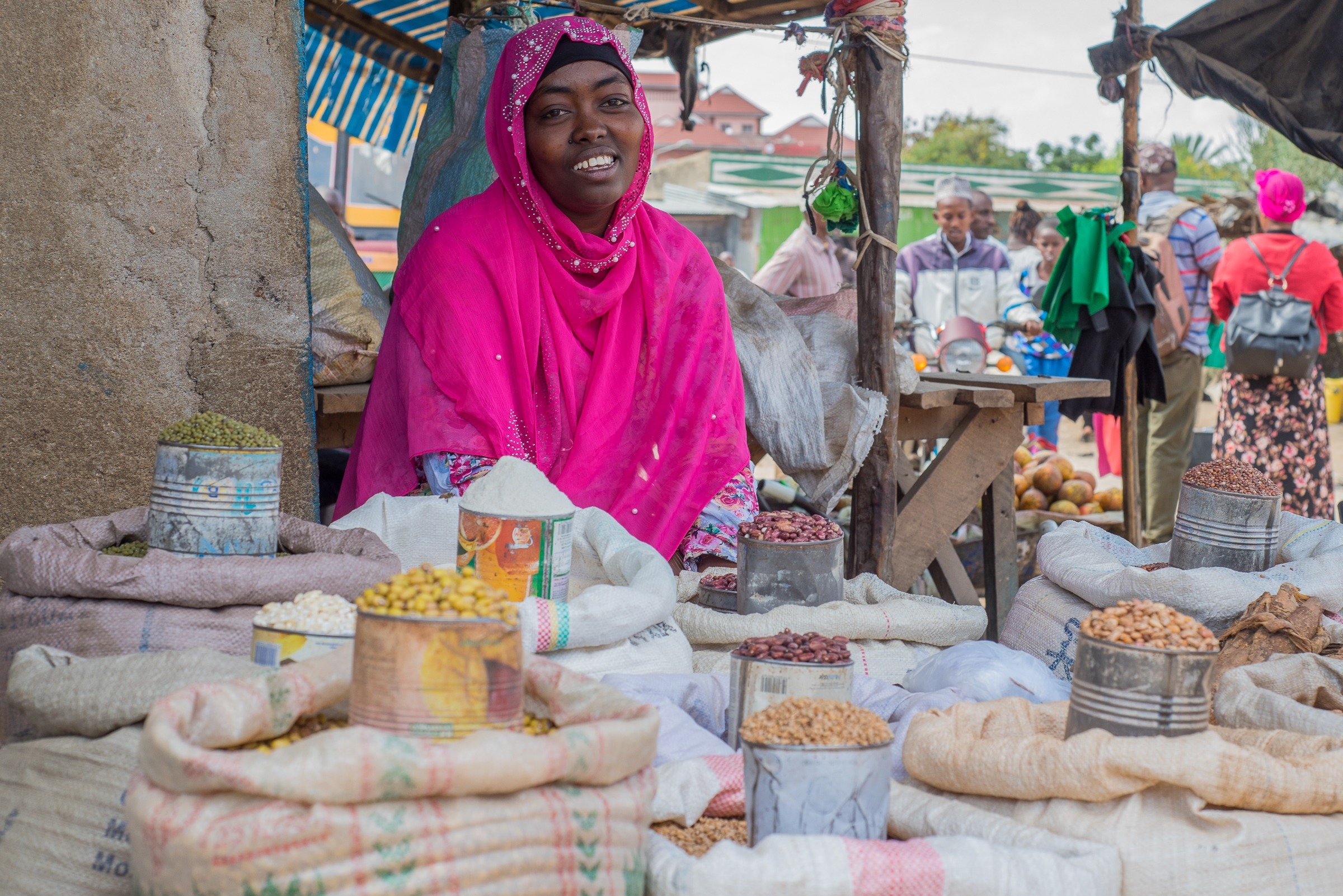
At the bustling and vibrant Moyale Market, located on the border of Kenya and Ethiopia, 18-year-old Fatuma Guyo sits patiently under the makeshift stall. It is early morning but Fatuma has already laid out several sacks of maize flour, beans, lentils, beans, sesame, and maize seeds. She waits patiently for buyers.
This business has become Fatuma’s saving grace. She explains that “I had to stop formal education after finishing elementary school in 2012. My parents could not afford to pay for my sister and I. I never thought that I would have an opportunity to be able to engage in a business like this and support my family and sister.”
After dropping out of school, Fatuma started a small kitchen garden in her parent’s compound for home consumption. She sold any surplus to her neighbors. During this time, she still desired to learn and gain knowledge about income-generating activities that would help her grow and hopefully lift her family out of poverty. “Knowledge is very important, so I sought any opportunity to find ways to develop and grow,” Fatuma reflects.
GIRL Program Provides Business and Life Skills Training
In March 2018, the opportunity Fatuma desired presented itself through the Girls Improving Resilience Through Livelihoods (GIRL) program. GIRL, a program implemented by USAID-funded Feed the Future Kenya Livestock Market Systems (LMS) Activity, strengthens young women’s empowerment through education, access to livelihoods, and asset ownership. One of the program’s main objectives is to equip girls with literacy, numeracy, and life skills such as reproductive health, nutrition, financial literacy, and business skills. Young women apply these new skills and insights to improve their life chances, build successful businesses, and improve their health. The program targets girls aged between 10 and 19 years. The GIRL program takes participants through a structured nine-month training and mentoring workshop. When Fatuma heard about the GIRL program, she signed up immediately. She began to quench her thirst for knowledge as part of Marsabit’s very first GIRL group.
“The trainings were important to me because I had never had an opportunity to learn these things earlier. Thanks to the lessons I received on business setup, budgeting, and savings, I became aware of how to start and run my own business.”
Fatuma GUYO, GIRL Project Participant
Fatuma connected with two other young women during the training sessions. Even before they finished the classes, they put into practice what they learned. They pooled their money and started saving. In late 2019, they had saved Kes. 30,000 ($300). With this money, they bought cereals in bulk to resell at the market. Within two weeks, they had cleared their stock and made back the initial capital, plus a profit of Kes. 30,000 ($300). They restocked their stall and with the profits, they decided to diversify their operations by investing in an eatery in their home village.
As business picked up, Fatuma continued to support her parents. “When we began sharing our profits, I decided to help my parents pay my sister’s school fees as she was now in her last year of secondary education. When she finished, I was able to fully support her [to] attend a computer college and currently, she works at a cybercafé here in town,” Fatuma explains. Fatuma plans to one day build a shop where she can sell her cereals wholesale as she continues to support her family.
Since the project’s inception, LMS has trained over 7,100 girls across Marsabit, Turkana, Wajir, Isiolo, and Garissa. As the world grapples with COVID-19 pandemic, LMS reached out to Fatuma and other group leaders as part of a sensitization campaign. Sabdio Darso, LMS GIRL Officer in Marsabit, says “I have talked with Fatuma and other group leaders via telephone in order to emphasize the importance of frequent thorough hand washing and social distancing as she continues to conduct business.”
The Feed the Future Kenya Livestock Market Systems Activity is a USAID-funded program implemented by ACDI/VOCA, in coordination with partners Mercy Corps, Smart Regional Consultants, and the BOMA Project. Under the Activity, Strengthening Community Capacities for Resilience and Growth Award, Mercy Corps seeks to reduce global hunger, malnutrition, and poverty through inclusive and sustainable agriculture-led growth as well as the improved resilience and nutritional status of the population. Through its Girls Improving Resilience Through Livelihoods (GIRL) Program, which spans Turkana, Marsabit, Isiolo, Wajir, and Garissa counties, 8,577 adolescent girls have completed “safe space” training. The program has also disbursed USD 5,987 in grants for small business loans or school fees at secondary or technical institutes. The Activity also works with county governments to advise and craft policies empowering women and girls.
Learn more about our work in Kenya here
Learn more about our Feed the Future Kenya Livestock Market Systems Activity here







